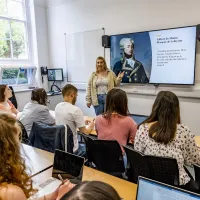About this course
Learn about the ancient world and find ways to understand the foundations of how we live today. You'll develop specialist knowledge in your chosen areas of study and learn in an engaging and supportive research environment. You can also choose to spend time at a university abroad.
On this UK ancient history degree you'll study the ancient world in depth and we will help you to develop your career interests and discover ancient history degree jobs.
Ancient history is an interdisciplinary field, so you can study topics that you’re already passionate about, or choose to try something new.
Our wide range of topics cover ancient Egypt to the rise of Islam in the Middle East. You can also explore what happened during the conquests of Alexander the Great, and at the end of the Roman Empire.
Why study ancient history with us:
- learn ancient history from experts on the ancient world (including history, archaeology, ancient and modern languages and literatures, philosophy and film)
- gain experience of archaeological fieldwork and take part in study tours
- develop your research and dissertation skills
- challenge yourself by learning Latin
- spend time at a university abroad in Europe, the United States, Hong Kong, Japan, South Korea or Australia
Year abroad
A year abroad will enhance your understanding of ancient history and let you experience a new culture. Discover more benefits and financial support options for studying abroad.
Apply using:
- course name: Ancient History with With A Year Abroad
- UCAS code: V1V6
We regularly review our courses to ensure and improve quality. This course may be revised as a result of this. Any revision will be balanced against the requirement that the student should receive the educational service expected. Find out why, when, and how we might make changes.
Our courses are regulated in England by the Office for Students (OfS).
Course location
This course is based at Avenue.
Awarding body
This qualification is awarded by the University of Southampton.
Download the Course Description Document
The Course Description Document details your course overview, your course structure and how your course is taught and assessed.
Entry requirements
For Academic year 202526
A-levels
AAB including an essay writing subject*
A-levels additional information
Offers typically exclude General Studies and Critical Thinking. *Essay writing subjects include History, English, Philosophy, Politics, Law, Criminology, Sociology, Geography, Religious Studies, Classical Civilisation, Latin or other humanities based essay writing subjects.
A-levels with Extended Project Qualification
If you are taking an EPQ in addition to 3 A levels, you will receive the following offer in addition to the standard A level offer: ABB including an essay writing subject* and grade A in the EPQ
A-levels contextual offer
We are committed to ensuring that all applicants with the potential to succeed, regardless of their background, are encouraged to apply to study with us. The additional information gained through contextual data allows us to recognise an applicant's potential to succeed in the context of their background and experience. Applicants who are highlighted in this way will be made an offer which is lower than the typical offer for that programme.
International Baccalaureate Diploma
Pass, with 34 points overall with 17 points at Higher Level, including 5 at Higher Level in an essay writing subject*
International Baccalaureate Diploma additional information
Offers typically exclude General Studies and Critical Thinking. *Essay writing subjects include History, English, Philosophy, Politics, Law, Criminology, Sociology, Geography, Religious Studies, Classical Civilisation, Latin or other humanities based essay writing subjects.
International Baccalaureate contextual offer
We are committed to ensuring that all learners with the potential to succeed, regardless of their background, are encouraged to apply to study with us. The additional information gained through contextual data allows us to recognise a learner’s potential to succeed in the context of their background and experience. Applicants who are highlighted in this way will be made an offer which is lower than the typical offer for that programme.
International Baccalaureate Career Programme (IBCP) statement
Offers will be made on the individual Diploma Course subject(s) and the career-related study qualification. The CP core will not form part of the offer. Where there is a subject pre-requisite(s), applicants will be required to study the subject(s) at Higher Level in the Diploma course subject and/or take a specified unit in the career-related study qualification. Applicants may also be asked to achieve a specific grade in those elements. Please see the University of Southampton International Baccalaureate Career-Related Programme (IBCP) Statement for further information. Applicants are advised to contact their Faculty Admissions Office for more information.
BTEC
Distinction, Distinction in the BTEC National Extended Diploma plus A in an A level essay writing subject*. Distinction, Distinction in the BTEC National Diploma plus A in an A level Humanities subject* Distinction in the BTEC National Extended Certificate plus A in an A level essay writing subject* and A in one further A level
RQF BTEC
We are committed to ensuring that all learners with the potential to succeed, regardless of their background, are encouraged to apply to study with us. The additional information gained through contextual data allows us to recognise a learner’s potential to succeed in the context of their background and experience. Applicants who are highlighted in this way will be made an offer which is lower than the typical offer for that programme.
Additional information
Offers typically exclude General Studies and Critical Thinking. *Essay writing subjects include History, English, Philosophy, Politics, Law, Criminology, Sociology, Geography, Religious Studies, Classical Civilisation, Latin or other humanities based essay writing subjects.
QCF BTEC
Distinction, Distinction in the BTEC Extended Diploma plus A in an A level Humanities subject*. or Distinction, Distinction in the BTEC Diploma plus A in an A level essay writing subject* or Distinction in the BTEC Subsidiary Diploma plus A in an A level essay writing subject* and A in one further A level
We are committed to ensuring that all learners with the potential to succeed, regardless of their background, are encouraged to apply to study with us. The additional information gained through contextual data allows us to recognise a learner’s potential to succeed in the context of their background and experience. Applicants who are highlighted in this way will be made an offer which is lower than the typical offer for that programme.
Access to HE Diploma
60 credits with a minimum of 45 credits at Level 3, of which 39 must be at Distinction and 6 credits at Merit, to include 6 Distinctions in an essay writing subject*
Access to HE additional information
Offers typically exclude General Studies and Critical Thinking. *Essay writing subjects include History, English, Philosophy, Politics, Law, Criminology, Sociology, Geography, Religious Studies, Classical Civilisation, Latin or other humanities based essay writing subjects.
Irish Leaving Certificate
Irish Leaving Certificate (first awarded 2017)
H1 H2 H2 H2 H2 H2 including an essay writing subject*
Irish certificate additional information
Offers typically exclude General Studies and Critical Thinking. *Essay writing subjects include History, English, Philosophy, Politics, Law, Criminology, Sociology, Geography, Religious Studies, Classical Civilisation, Latin or other humanities based essay writing subjects.
Scottish Qualification
Offers will be based on exams being taken at the end of S6. Subjects taken and qualifications achieved in S5 will be reviewed. Careful consideration will be given to an individual’s academic achievement, taking in to account the context and circumstances of their pre-university education.
Please see the University of Southampton’s Curriculum for Excellence Scotland Statement (PDF) for further information. Applicants are advised to contact their Faculty Admissions Office for more information.
Cambridge Pre-U
D3 D3 M2 in three principal subjects including an essay writing subject*
Cambridge Pre-U additional information
Offers typically exclude General Studies and Critical Thinking. *Essay writing subjects include History, English, Philosophy, Politics, Law, Criminology, Sociology, Geography, Religious Studies, Classical Civilisation, Latin or other humanities based essay writing subjects.
Welsh Baccalaureate
AAB from 3 A levels including an essay writing subject* or AA from two A levels including an essay writing subject* and B from the Advanced Welsh Baccalaureate Skills Challenge Certificate
Welsh Baccalaureate additional information
Offers typically exclude General Studies and Critical Thinking. *Essay writing subjects include History, English, Philosophy, Politics, Law, Criminology, Sociology, Geography, Religious Studies, Classical Civilisation, Latin or other humanities based essay writing subjects.
Welsh Baccalaureate contextual offer
We are committed to ensuring that all learners with the potential to succeed, regardless of their background, are encouraged to apply to study with us. The additional information gained through contextual data allows us to recognise a learner’s potential to succeed in the context of their background and experience. Applicants who are highlighted in this way will be made an offer which is lower than the typical offer for that programme.
T-Level
Not accepted for this course.
Other requirements
GCSE requirements
Applicants must hold GCSE English language (or GCSE English) (minimum grade 4/C) and mathematics (minimum grade 4/C)
Find the equivalent international qualifications for our entry requirements.
English language requirements
If English isn't your first language, you'll need to complete an International English Language Testing System (IELTS) to demonstrate your competence in English. You'll need all of the following scores as a minimum:
IELTS score requirements
- overall score
- 6.5
- reading
- 6.0
- writing
- 6.0
- speaking
- 6.0
- listening
- 6.0
We accept other English language tests. Find out which English language tests we accept.
If you don’t meet the English language requirements, you can achieve the level you need by completing a pre-sessional English programme before you start your course.
You might meet our criteria in other ways if you do not have the qualifications we need. Find out more about:
- our Ignite your Journey scheme for students living permanently in the UK (including residential summer school, application support and scholarship)
- skills you might have gained through work or other life experiences (otherwise known as recognition of prior learning)
Find out more about our Admissions Policy.
For Academic year 202627
A-levels
AAB
A-levels additional information
Offers typically exclude General Studies and Critical Thinking.
A-levels with Extended Project Qualification
If you are taking an EPQ in addition to 3 A levels, you will receive the following offer in addition to the standard A level offer: ABB and grade A in the EPQ
A-levels contextual offer
We are committed to ensuring that all applicants with the potential to succeed, regardless of their background, are encouraged to apply to study with us. The additional information gained through contextual data allows us to recognise an applicant's potential to succeed in the context of their background and experience. Applicants who are highlighted in this way will be made an offer which is lower than the typical offer for that programme.
International Baccalaureate Diploma
Pass, with 34 points overall with 17 points at Higher Level.
International Baccalaureate Diploma additional information
Offers typically exclude General Studies and Critical Thinking.
International Baccalaureate contextual offer
We are committed to ensuring that all learners with the potential to succeed, regardless of their background, are encouraged to apply to study with us. The additional information gained through contextual data allows us to recognise a learner’s potential to succeed in the context of their background and experience. Applicants who are highlighted in this way will be made an offer which is lower than the typical offer for that programme.
International Baccalaureate Career Programme (IBCP) statement
Offers will be made on the individual Diploma Course subject(s) and the career-related study qualification. The CP core will not form part of the offer. Where there is a subject pre-requisite(s), applicants will be required to study the subject(s) at Higher Level in the Diploma course subject and/or take a specified unit in the career-related study qualification. Applicants may also be asked to achieve a specific grade in those elements. Please see the University of Southampton International Baccalaureate Career-Related Programme (IBCP) Statement for further information. Applicants are advised to contact their Faculty Admissions Office for more information.
BTEC
Distinction, Distinction in the BTEC National Extended Diploma plus A in an A level. Distinction, Distinction in the BTEC National Diploma plus A in an A level. Distinction in the BTEC National Extended Certificate plus A in an A level and A in one further A level
RQF BTEC
We are committed to ensuring that all learners with the potential to succeed, regardless of their background, are encouraged to apply to study with us. The additional information gained through contextual data allows us to recognise a learner’s potential to succeed in the context of their background and experience. Applicants who are highlighted in this way will be made an offer which is lower than the typical offer for that programme.
Additional information
Offers typically exclude General Studies and Critical Thinking.
QCF BTEC
Distinction, Distinction in the BTEC Extended Diploma plus A in an A level or Distinction, Distinction in the BTEC Diploma plus A in an A level, or Distinction in the BTEC Subsidiary Diploma plus A in an A level and A in one further A level
We are committed to ensuring that all learners with the potential to succeed, regardless of their background, are encouraged to apply to study with us. The additional information gained through contextual data allows us to recognise a learner’s potential to succeed in the context of their background and experience. Applicants who are highlighted in this way will be made an offer which is lower than the typical offer for that programme.
Access to HE Diploma
60 credits with a minimum of 45 credits at Level 3, of which 39 must be at Distinction and 6 credits at Merit.
Access to HE additional information
Offers typically exclude General Studies and Critical Thinking.
Irish Leaving Certificate
Irish Leaving Certificate (first awarded 2017)
H1 H2 H2 H2 H2 H2
Irish certificate additional information
Offers typically exclude General Studies and Critical Thinking.
Scottish Qualification
Offers will be based on exams being taken at the end of S6. Subjects taken and qualifications achieved in S5 will be reviewed. Careful consideration will be given to an individual’s academic achievement, taking in to account the context and circumstances of their pre-university education.
Please see the University of Southampton’s Curriculum for Excellence Scotland Statement (PDF) for further information. Applicants are advised to contact their Faculty Admissions Office for more information.
Cambridge Pre-U
D3 D3 M2 in three principal subjects
Cambridge Pre-U additional information
Offers typically exclude General Studies and Critical Thinking.
Welsh Baccalaureate
AAB from 3 A levels or AA from two A levels and B from the Advanced Skills Baccalaureate Wales.
Welsh Baccalaureate additional information
Offers typically exclude General Studies and Critical Thinking.
Welsh Baccalaureate contextual offer
We are committed to ensuring that all learners with the potential to succeed, regardless of their background, are encouraged to apply to study with us. The additional information gained through contextual data allows us to recognise a learner’s potential to succeed in the context of their background and experience. Applicants who are highlighted in this way will be made an offer which is lower than the typical offer for that programme.
T-Level
Not accepted for this course.
Other requirements
GCSE requirements
Applicants must hold GCSE English language (or GCSE English) (minimum grade 4/C) and mathematics (minimum grade 4/C)
Find the equivalent international qualifications for our entry requirements.
English language requirements
If English isn't your first language, you'll need to complete an International English Language Testing System (IELTS) to demonstrate your competence in English. You'll need all of the following scores as a minimum:
IELTS score requirements
- overall score
- 6.5
- reading
- 6.0
- writing
- 6.0
- speaking
- 6.0
- listening
- 6.0
We accept other English language tests. Find out which English language tests we accept.
If you don’t meet the English language requirements, you can achieve the level you need by completing a pre-sessional English programme before you start your course.
You might meet our criteria in other ways if you do not have the qualifications we need. Find out more about:
- our Ignite your Journey scheme for students living permanently in the UK (including residential summer school, application support and scholarship)
- skills you might have gained through work or other life experiences (otherwise known as recognition of prior learning)
Find out more about our Admissions Policy.
Got a question?
Please contact our enquiries team if you're not sure that you have the right experience or qualifications to get onto this course.
Email: enquiries@southampton.ac.uk
Tel: +44(0)23 8059 5000
Course structure
Each year is made up of a combination of compulsory and optional modules. You'll have the opportunity to study archaeological methods and carry out fieldwork to enhance your understanding of the ancient world.
You can broaden your experience beyond our ancient history courses by choosing:
- interdisciplinary modules
- language modules, Latin
- options to study abroad for a semester
You do not need to choose your modules when you apply. We'll guide you through the process before you start.
Year 1 overview
Compulsory modules provide an introduction to the ancient world and its source materials.
You'll also be able to choose from optional modules. These cover topics such as the emergence of civilisation, Alexander the Great, or the Romans in Britain.
Year 2 overview
Your optional modules include myths in the ancient world, and ancient Rome from an archaeological perspective.
You'll also carry out a group research project. This will develop your team working, communication and problem-solving skills.
Year 3 overview
The Reading Histories module in semester 1 will help you to shape your ideas for your dissertation. You'll work closely with a group who are interested in a similar historical period to critically engage with key literature and historiographical approaches.
You can also choose from specialist module options. These include Ancient Egypt, the Emperor Julian, or urbanisation in Ancient Rome.
Want more detail? See all the modules in the course.
Modules
The modules outlined provide examples of what you can expect to learn on this degree course based on recent academic teaching. As a research-led University, we undertake a continuous review of our course to ensure quality enhancement and to manage our resources. The precise modules available to you in future years may vary depending on staff availability and research interests, new topics of study, timetabling and student demand. Find out why, when and how we might make changes.
For entry in academic year 2025 to 2026
Year 1 modules
You must study the following modules in year 1:
Ancient Sources in Context
The history of the ancient world is hugely significant for understanding subsequent periods of history and the origins of ideas and institutions of global significance. However, the nature of the ancient world continues to be highly debated due to the sou...
Introduction to the Ancient World
The Ancient World has profoundly influenced subsequent generations of history, and helps us to understand the foundations of today’s world. This module provides an introduction to this momentous period of history from Dark Age Greece to the emergence of I...
The Ancient World in the Modern Day
In this module you will consider the relationship between the ancient world and the modern world. We will consider how new approaches to ancient societies have been developed in response to modern social and political developments. We will also look at ex...
You must also choose from the following modules in year 1:
Debates and Issues in Archaeological Science
The application of scientific techniques is increasingly embedded in archaeological studies and is an area where the UK currently leads the world. Techniques such as dating methods, the use of isotopes to reconstruct past diet or human migrations and the ...
From Alexander to Augustus: Leadership in the Ancient World
Alexander, Sulla, Julius Caesar and Augustus are names which epitomise leadership and authority both in the ancient world and in more recent periods of history. In this module, you will look at the political systems under which they emerged as leaders, an...
From Constantine to Theodosius: Christians, Pagans and Emperors
The 4th century CE was a time of upheaval and change. Christianity became established as the state religion of the Roman empire, the split between the eastern and western empire was cemented, and the first large group of Goths crossed the Roman border. In...
Introduction to Ethnography: Food and Culture
Biological science tells us what items in our world are potentially edible, but culture decides what constitutes food. Culture informs us as to whether a specific item is appropriate, appetising, valued, desirable, prohibited, restricted, staple or medici...
Introduction to Historical Archaeology
In a common analogy where the c.4.5 billion years of Earth's geological history are equated to a 24-hour day - modern humans appearing only within the last 4 seconds - written human history begins only in the last 100 milliseconds. That time, though, saw ...
Landscapes and Seascapes of Britain’s Past
The landscapes and seascapes of Britain play host to one of the world’s most varied and intriguing archaeological records. With an occupational history spanning one million years, it tells a complex inter-twined story of social, physical and environmenta...
Masada: History and Myth
The Dead Sea fortress Masada was the last stronghold of resistance to Roman rule in Judea. Following the outbreak of revolt against Rome (66) and the fall of Jerusalem to the soldiers of the Roman emperor Vespasian (70), the fortress was finally taken in...
Year 2 modules
You must study the following modules in year 2:
Humanities Study Abroad Preparation Module
This module will prepare you for study abroad and also take you through the application process for study abroad. Before you travel, you are required to take out appropriate insurance policies and engage in on-going monitoring of risk and this module will...
Making History Part 1
History has a life which stretches far beyond the ivory tower of academia and university study. This module encourages you to reflect on how historians translate academic knowledge into public history. It introduces you to the many different audiences for...
Making History Part 2
In this module, you will work at the leading edge of historical research, generate new knowledge about a specific subject or topic, and consider how this might be translated into public history for a range of audiences. You will choose one from a wide sel...
Year Abroad Report Module for Humanities Students
This non-credit bearing module is a required element for all Humanities students on a Year Abroad Programme. It builds on the Year Abroad preparation module, HUMA2012. It is taken as a long thin single module whilst on the Year Abroad with a two hour prep...
Year in Employment
The Year in Employment (YiE) is an opportunity for undergraduate students across a range of programmes to undertake a placement year whilst remaining enrolled to the University of Southampton. Students complete their placement after their second year of s...
You must also choose from the following modules in year 2:
Ancient Greek 2
‘Ancient Greek 1B’ is designed to build on the knowledge acquired by students who have taken ‘Ancient Greek 1A’, but may also be appropriate for those with some previous alternative experience (e.g. a GCSE). The module will improve your ability to read, c...
Ancient Greek Philosophy
Philosophy has always progressed by being aware of its past, and it has been said that the legacy of the ancient Greek thinkers to Western philosophy is nothing less than Western philosophy itself. The ancients invented our subject, and Plato and Aristotl...
Ancient Greeks at War
From the legendary tales of the Trojan War up to the conquest of Persia by Alexander the Great, warfare played a central role in ancient Greek history and society. This module allows you to examine ancient Greek warfare from a range of different sources a...
Ancient Rome: the First Metropolis
This module focusses on the city of Rome and its development from its early foundation through to the third century AD. It explores the evidence for one of the most important cities of the ancient world, which at its height was home to approximately a mil...
Bones, bodies and burials: osteology and comparative anatomy
This module examines the variation within the mammalian skeleton from an evolutionary and functional perspective. Additionally, it gives an overview of the main methodological and theoretical issues in the retrieval, treatment and interpretation of bone f...
Imperial China: From China’s mythical emperors to the 19th century
This module will discuss Chinese history from its mythical beginnings to the 19th century (the time when China encountered the West). We will encounter famous figures like the philosopher Confucius, discuss the origins of the Silk Road and the Great Wall,...
Introduction to Ethnography: Food and Culture
Biological science tells us what items in our world are potentially edible, but culture decides what constitutes food. Culture informs us as to whether a specific item is appropriate, appetising, valued, desirable, prohibited, restricted, staple or medici...
Introduction to Film Studies
This module will familiarise you with the basic principles of film form, narrative and style. It will introduce specialist terminology needed to describe formal elements of audio-visual language and foster your analytical ability in the interpretation of ...
Latin 1
The ability to understand Latin enables direct access to a wealth of primary source material across a vast chronological span, from the ancient world to the early modern period, on subjects ranging from history and literature to philosophy and science. ‘L...
Latin 2
‘Latin 2’ is designed to build on the knowledge acquired by students who have taken ‘Latin 1’, but may also be appropriate for those with some previous alternative experience (e.g. a GCSE). The module will equip you with the ability to read, comprehend, a...
Maritime Archaeology
This course aims to give students a sound introduction to the way archaeology is carried out underwater.
Myth and the Ancient World
What are myths and what do they do? In “Myth and the Ancient World” you will explore how the Ancient Greeks used myths to make sense of the world and their position in it. The module covers a time span of some 900 years, from the time of Homer and Hesiod ...
Peasants, Empresses and Holy Virgins: Women in Late Antiquity
Late Antiquity can be narrated as a period of powerful emperors, domineering bishops, and barbarian warlords. In this module we will be looking, instead, at the lives and agency of women during the same period. We look at women’s legal and social status a...
Rome: Politics and Power
The ancient Roman elite was highly competitive, with families and individuals fighting for control and influence in all spheres of social and political life, in elections, in the law courts, in the arenas, theatres, and temples of Rome, and outside of the...
The Life and Afterlife of the Vikings
Blood, violence, terror, raids, pirates, rape and pillage are just some of the words associated with the Vikings in both the medieval and modern imagination. Their fearsome reputation is underlined by nicknames such as ‘Blood Axe' and ‘Skull-splitter', bu...
The power of Rome: Europe’s first empire
The Roman empire has held the imagination of successive generations. Conquest by Rome brought social, cultural and economic change to large swathes of what is now Europe, the Middle East and north Africa. Never before or after did these parts of the world...
Year 3 modules
You must study the following modules in year 3:
Ancient History Dissertation
The dissertation is a key component of your degree; in it you have a chance to show the skills of analysis and research you have learned during the three years of your programme.
Reading Histories
The culmination of your history degree at Southampton will be the completion of your final year independent research dissertation (HIST3021 for History programmes or HIST3210 for Ancient History programmes). In this module you will learn how to apply the ...
You must also choose from the following modules in year 3:
A Short History of Just War
Wars have been fought throughout the history of mankind. Ethical concerns that they raised, or, in other words, the rights and wrongs of waging war, have been discussed from time immemorial. War has often been seen as an evil, a necessary evil, to be avoi...
Archaeology of Seafaring
Seafaring lies at the heart of human activity across the world and has taken place from the earliest times to the present day. Reflecting this, in recent years the study of seafaring has become an increasingly important area in our understanding of the hu...
Cultures in Contact: A Diverse Ancient World
Ancient History goes beyond Greece and Rome. The ancient world was incredibly diverse, inhabited by different cultures, religions, and societies which were closely connected and left their mark on each other, through interaction, conflict, and exchange. I...
Cultures in Contact: Resisting Rome
This module explores the Roman Empire, but from the perspective of those who resisted it, fought it, and rebelled against it. The study of the ancient world, throughout its different periods, is greatly influenced by Rome. Starting from its expansion duri...
Framing the Past:Stardom, History and Heritage in the Cinema
This module explores cinema’s relationship to the past, whether distant, as in that of ancient Greece, Rome or Egypt, or from a more recent history.
Later Anglo-Saxon England
This module examines the major social, economic and cultural developments that took place in England during the period between c. 800 and c. 1100 AD. It makes use of evidence from diverse disciplines, including the study of documentary, archaeological, ar...
Living with the Romans: Urbanism in the Roman Empire
The towns in which the Romans lived are some of the most familiar features of the Roman world. Although they seem to look and feel like modern towns, they actually worked in quite different ways, a reflection of the fact that ancient Roman society was dis...
More than Pyramids & Pharaohs? Ancient Egypt in Context
The module provides an introduction to the history and archaeology of ancient Egypt. The module provides a broad sweep of Egyptian history from the Predynastic through to later periods. It introduces aspects of death, burial and commemoration, compares an...
Presenting the past: Museums and Heritage
In this module we will examine how knowledge about the past is presented in museum exhibition and display. We will look at current practices in exhibition design and discuss the contemporary literature on communicating heritage to a range of audiences. Yo...
Specialist Research Topic in Archaeology
Learning and assessment
The learning activities for this course include the following:
- lectures
- classes and tutorials
- coursework
- individual and group projects
- independent learning (studying on your own)
Course time
How you'll spend your course time:
Year 1
Study time
Your scheduled learning, teaching and independent study for year 1:
How we'll assess you
- dissertations
- individual and group projects
- oral presentations
- written exams
Your assessment breakdown
Year 1:
Year 2
Study time
Your scheduled learning, teaching and independent study for year 2:
How we'll assess you
- dissertations
- individual and group projects
- oral presentations
- written exams
Your assessment breakdown
Year 2:
Year 3
Study time
Your scheduled learning, teaching and independent study for year 3:
How we'll assess you
- dissertations
- individual and group projects
- oral presentations
- written exams
Your assessment breakdown
Year 3:
Academic support
You’ll be supported by a personal academic tutor and have access to a senior tutor.
Course leader
Eleanor Quince is the course leader.
Careers and employability
Employability skills
This degree will allow you to develop and evidence subject-specific and targeted employability skills. This includes the required skill set for a range of future careers, further study, or starting your own business.
The skills you can expect to focus on and gain from this course include:
- Research
- Critical thinking
- Self-management
- Communication
- Teamwork
- Creativity
- Problem solving
The employability and enterprise skills you'll gain from this course are reflected in the Southampton skills model. When you join us you'll be able to use our skills model to track, plan, and benefit your career development and progress.
Download skills overview
Career pathways
Graduates commonly work in a range of organisations or sectors including:
Local Council Libraries,
universities,
schools,
colleges,
museums,
Galleries,
Publishing,
media groups,
Local government,
heritage service providers,
National Government,
Association of Police and Crime Commissioner,
Police Services,
Law Firms,
Hospitality,
tourism.
- Heritage manager
- Archivist
- Historic buildings officer
- Conservation officer
- Academic researcher
- Museum curator
- Museum exhibitions officer
- Gallery exhibitions officer
- Secondary school teacher
- Museum education officer
- Museum grants officer
- Academic librarian
- Information officer
- Policy officer
- Editorial assistant
- Library trainee
- Archaeologist
- Broadcast journalist
- Political assistant
- Social researcher
- Archives assistant
- Human resources specialist
- Secondary school teacher
- Tax assistant
- Assistant archaeologist
- Marketing executive
- Primary school teacher
- Recruitment consultant
- Civil servant
- Trainee solicitor
Job prospects for BA Ancient History graduates
*Example graduate job titles and job prospect statistics taken from The Graduate Outcomes Survey, which gathers information about the activities and perspectives of graduates 15 months after finishing their course.

Year in employment
You can apply for a year in employment placement on this course. This is a great way to improve your employability and confidence in your career prospects. Recommended by 100% of students who've taken part, you can apply for a UK or global placement in any sector.
Careers services and support
We are a top 20 UK university for employability (QS Graduate Employability Rankings 2022). Our Careers, Employability and Student Enterprise team will support you. This support includes:
- work experience schemes
- CV and interview skills and workshops
- networking events
- careers fairs attended by top employers
- a wealth of volunteering opportunities
- study abroad and summer school opportunities
We have a vibrant entrepreneurship culture and our dedicated start-up supporter, Futureworlds, is open to every student.
Your career ideas and graduate job opportunities may change while you're at university. So it is important to take time to regularly reflect on your goals, speak to people in industry and seek advice and up-to-date information from Careers, Employability and Student Enterprise professionals at the University.
Fees, costs and funding
Tuition fees
Fees for a year's study:
- UK students pay £9,535.
- EU and international students pay £24,200.
What your fees pay for
Your tuition fees pay for the full cost of tuition and standard exams.
Find out how to:
Accommodation and living costs, such as travel and food, are not included in your tuition fees. There may also be extra costs for retake and professional exams.
Explore:
Bursaries, scholarships and other funding
If you're a UK or EU student and your household income is under £25,000 a year, you may be able to get a University of Southampton bursary to help with your living costs. Find out about bursaries and other funding we offer at Southampton.
If you're a care leaver or estranged from your parents, you may be able to get a specific bursary.
Get in touch for advice about student money matters.
Scholarships and grants
You may be able to get a scholarship or grant to help fund your studies.
We award scholarships and grants for travel, academic excellence, or to students from under-represented backgrounds.
Support during your course
The Student Hub offers support and advice on money to students. You may be able to access our Student Support fund and other sources of financial support during your course.
Funding for EU and international students
Find out about funding you could get as an international student.
How to apply
What happens after you apply?
We will assess your application on the strength of your:
- predicted grades
- academic achievements
- personal statement
- academic reference
We'll aim to process your application within 2 to 6 weeks, but this will depend on when it is submitted. Applications submitted in January, particularly near to the UCAS equal consideration deadline, might take substantially longer to be processed due to the high volume received at that time.
Equality and diversity
We treat and select everyone in line with our Equality and Diversity Statement.
Got a question?
Please contact our enquiries team if you're not sure that you have the right experience or qualifications to get onto this course.
Email: enquiries@southampton.ac.uk
Tel: +44(0)23 8059 5000
Related courses
Ancient History (BA) is a course in the History subject area. Here are some other courses within this subject area:
-
Study
- View all courses
- Taught postgraduate study
- Pre-sessional English courses
-
Subjects
- Acoustical engineering
- Aeronautical and astronautical engineering
- Ageing and gerontology
- Archaeology
- Art, design and fashion
- Audiology
- Biological sciences
- Biomedical and medical engineering
- Business, accounting, finance and marketing
- Chemistry
- Civil engineering
- Computer science and software engineering
- Economics
- Education
- Electrical and electronic engineering
- English
- Film studies
- French
- Geography and environmental science
- History
- Languages and linguistics
- Law
- Maritime engineering
- Mathematical sciences
- Mechanical engineering
- Medicine
- Music
- Nursing, midwifery and healthcare
- Ocean and Earth science
- Philosophy
- Photonics and optoelectronics
- Physics and astronomy
- Politics and international relations
- Psychology
- Social statistics and demography
- Sociology, social policy and criminology
-
PhDs and research degrees
- Create your own research project
-
Find a PhD project
- A missing link between continental shelves and the deep sea: Have we underestimated the importance of land-detached canyons?
- A study of rolling contact fatigue in electric vehicles (EVs)
- Acoustic monitoring of forest exploitation to establish community perspectives of sustainable hunting
- Acoustic sensing and characterisation of soil organic matter
- Advancing intersectional geographies of diaspora-led development in times of multiple crises
- Aero engine fan wake turbulence – Simulation and wind tunnel experiments
- Against Climate Change (DACC): improving the estimates of forest fire smoke emissions
- All-in-one Mars in-situ resource utilisation (ISRU) system and life-supporting using non-thermal plasma
- An electromagnetic study of the continent-ocean transition southwest of the UK
- An investigation of the relationship between health, home and law in the context of poor and precarious housing, and complex and advanced illness
- Antibiotic resistance genes in chalk streams
- Being autistic in care: Understanding differences in care experiences including breakdowns in placements for autistic and non-autistic children
- Biogeochemical cycling in the critical coastal zone: Developing novel methods to make reliable measurements of geochemical fluxes in permeable sediments
- Bloom and bust: seasonal cycles of phytoplankton and carbon flux
- British Black Lives Matter: The emergence of a modern civil rights movement
- Building physics for low carbon comfort using artificial intelligence
- Building-resolved large-eddy simulations of wind and dispersion over a city scale urban area
- Business studies and management: accounting
- Business studies and management: banking and finance
- Business studies and management: decision analytics and risk
- Business studies and management: digital and data driven marketing
- Business studies and management: human resources (HR) management and organisational behaviour
- Business studies and management: strategy, innovation and entrepreneurship
- Carbon storage in reactive rock systems: determining the coupling of geo-chemo-mechanical processes in reactive transport
- Cascading hazards from the largest volcanic eruption in over a century: What happened when Hunga Tonga-Hunga Ha’apai erupted in January 2022?
- Characterisation of cast austenitic stainless steels using ultrasonic backscatter and artificial intelligence
- Climate Change effects on the developmental physiology of the small-spotted catshark
- Climate at the time of the Human settlement of the Eastern Pacific
- Collaborative privacy in data marketplaces
- Compatibility of climate and biodiversity targets under future land use change
- Cost of living in modern and fossil animals
- Creative clusters in rural, coastal and post-industrial towns
- Deep oceanic convection: the outsized role of small-scale processes
- Defect categories and their realisation in supersymmetric gauge theory
- Defining the Marine Fisheries-Energy-Environment Nexus: Learning from shocks to enhance natural resource resilience
- Design and fabrication of next generation optical fibres
- Developing a practical application of unmanned aerial vehicle technologies for conservation research and monitoring of endangered wildlife
- Development and evolution of animal biomineral skeletons
- Development of all-in-one in-situ resource utilisation system for crewed Mars exploration missions
- Ecological role of offshore artificial structures
- Effect of embankment and subgrade weathering on railway track performance
- Efficient ‘whole-life’ anchoring systems for offshore floating renewables
- Electrochemical sensing of the sea surface microlayer
- Engagement with nature among children from minority ethnic backgrounds
- Enhancing UAV manoeuvres and control using distributed sensor arrays
- Ensuring the Safety and Security of Autonomous Cyber-Physical Systems
- Environmental and genetic determinants of Brassica crop damage by the agricultural pest Diamondback moth
- Estimating marine mammal abundance and distribution from passive acoustic and biotelemetry data
- Evolution of symbiosis in a warmer world
- Examining evolutionary loss of calcification in coccolithophores
- Explainable AI (XAI) for health
- Explaining process, pattern and dynamics of marine predator hotspots in the Southern Ocean
- Exploring dynamics of natural capital in coastal barrier systems
- Exploring the mechanisms of microplastics incorporation and their influence on the functioning of coral holobionts
- Exploring the potential electrical activity of gut for healthcare and wellbeing
- Exploring the trans-local nature of cultural scene
- Facilitating forest restoration sustainability of tropical swidden agriculture
- Faulting, fluids and geohazards within subduction zone forearcs
- Faulting, magmatism and fluid flow during volcanic rifting in East Africa
- Fingerprinting environmental releases from nuclear facilities
- Flexible hybrid thermoelectric materials for wearable energy harvesting
- Floating hydrokinetic power converter
- Glacial sedimentology associated subglacial hydrology
- Green and sustainable Internet of Things
- How do antimicrobial peptides alter T cell cytokine production?
- How do calcifying marine organisms grow? Determining the role of non-classical precipitation processes in biogenic marine calcite formation
- How do neutrophils alter T cell metabolism?
- How well can we predict future changes in biodiversity using machine learning?
- Hydrant dynamics for acoustic leak detection in water pipes
- If ‘Black Lives Matter’, do ‘Asian Lives Matter’ too? Impact trajectories of organisation activism on wellbeing of ethnic minority communities
- Illuminating luciferin bioluminescence in dinoflagellates
- Imaging quantum materials with an XFEL
- Impact of neuromodulating drugs on gut microbiome homeostasis
- Impact of pharmaceuticals in the marine environment in a changing world
- Improving subsea navigation using environment observations for long term autonomy
- Information theoretic methods for sensor management
- Installation effect on the noise of small high speed fans
- Integrated earth observation mapping change land sea
- Interconnections of past greenhouse climates
- Investigating IgG cell depletion mechanisms
- Is ocean mixing upside down? How mixing processes drive upwelling in a deep-ocean basin
- Landing gear aerodynamics and aeroacoustics
- Lightweight gas storage: real-world strategies for the hydrogen economy
- Machine learning for multi-robot perception
- Machine learning for multi-robot perception
- Marine ecosystem responses to past climate change and its oceanographic impacts
- Mechanical effects in the surf zone - in situ electrochemical sensing
- Microfluidic cell isolation systems for sepsis
- Migrant entrepreneurship, gender and generation: context and family dynamics in small town Britain
- Miniaturisation in fishes: evolutionary and ecological perspectives
- Modelling high-power fibre laser and amplifier stability
- Modelling soil dewatering and recharge for cost-effective and climate resilient infrastructure
- Modelling the evolution of adaptive responses to climate change across spatial landscapes
- Nanomaterials sensors for biomedicine and/or the environment
- New high-resolution observations of ocean surface current and winds from innovative airborne and satellite measurements
- New perspectives on ocean photosynthesis
- Novel methods of detecting carbon cycling pathways in lakes and their impact on ecosystem change
- Novel technologies for cyber-physical security
- Novel transparent conducting films with unusual optoelectronic properties
- Novel wavelength fibre lasers for industrial applications
- Ocean circulation and the Southern Ocean carbon sink
- Ocean influence on recent climate extremes
- Ocean methane sensing using novel surface plasmon resonance technology
- Ocean physics and ecology: can robots disentangle the mix?
- Ocean-based Carbon Dioxide Removal: Assessing the utility of coastal enhanced weathering
- Offshore renewable energy (ORE) foundations on rock seabeds: advancing design through analogue testing and modelling
- Optical fibre sensing for acoustic leak detection in buried pipelines
- Optimal energy transfer in nonlinear systems
- Optimal energy transfer in nonlinear systems
- Optimizing machine learning for embedded systems
- Oxidation of fossil organic matter as a source of atmospheric CO2
- Partnership dissolution and re-formation in later life among individuals from minority ethnic communities in the UK
- Personalized multimodal human-robot interactions
- Preventing disease by enhancing the cleaning power of domestic water taps using sound
- Quantifying riparian vegetation dynamics and flow interactions for Nature Based Solutions using novel environmental sensing techniques
- Quantifying the response and sensitivity of tropical forest carbon sinks to various drivers
- Quantifying variability in phytoplankton electron requirements for carbon fixation
- Resilient and sustainable steel-framed building structures
- Resolving Antarctic meltwater events in Southern Ocean marine sediments and exploring their significance using climate models
- Robust acoustic leak detection in water pipes using contact sound guides
- Silicon synapses for artificial intelligence hardware
- Smart photon delivery via reconfigurable optical fibres
- The Gulf Stream control of the North Atlantic carbon sink
- The Mayflower Studentship: a prestigious fully funded PhD studentship in bioscience
- The calming effect of group living in social fishes
- The duration of ridge flank hydrothermal exchange and its role in global biogeochemical cycles
- The evolution of symmetry in echinoderms
- The impact of early life stress on neuronal enhancer function
- The oceanic fingerprints on changing monsoons over South and Southeast Asia
- The role of iron in nitrogen fixation and photosynthesis in changing polar oceans
- The role of singlet oxygen signaling in plant responses to heat and drought stress
- Time variability on turbulent mixing of heat around melting ice in the West Antarctic
- Triggers and Feedbacks of Climate Tipping Points
- Uncovering the drivers of non-alcoholic fatty liver disease progression using patient derived organoids
- Understanding recent land-use change in Snowdonia to plan a sustainable future for uplands: integrating palaeoecology and conservation practice
- Understanding the role of cell motility in resource acquisition by marine phytoplankton
- Understanding the structure and engagement of personal networks that support older people with complex care needs in marginalised communities and their ability to adapt to increasingly ‘digitalised’ health and social care
- Unpicking the Anthropocene in the Hawaiian Archipelago
- Unraveling oceanic multi-element cycles using single cell ionomics
- Unravelling southwest Indian Ocean biological productivity and physics: a machine learning approach
- Using acoustics to monitor how small cracks develop into bursts in pipelines
- Using machine learning to improve predictions of ocean carbon storage by marine life
- Vulnerability of low-lying coastal transportation networks to natural hazards
- X-ray imaging and property characterisation of porous materials
- Funding your research degree
- How to apply for a PhD or research degree
- How to make a PhD enquiry
- Support while studying your PhD or research degree
- Exchanges and studying abroad
- Undergraduate study
-
Tuition fees, funding and scholarships
-
Scholarships
-
Postgraduate scholarships
- Black Futures scholarship
- GREAT Scholarships 2025 – Egypt
- GREAT Scholarships 2025 – France
- GREAT Scholarships 2025 – Ghana
- Horizon Europe fee waiver
- Innovation and Social Impact Scholarships
- Postgraduate Taught Diversity Scholarship (Environmental and Life Sciences)
- Southampton Business School Postgraduate UK Scholarship
- Southampton Genomics Talent Scholarship
- Southampton History Patricia Mather and Helen Patterson Scholarship
- Southampton MA Holocaust scholarships
- Southampton Philosophy David Humphris-Norman Scholarship
- Southampton Photonics Impact Scholarship
- Southampton UK Alumni Music Scholarship
- Study in Art and Media Technology Scholarship
- The National Institute for Health and care Research South Central INSIGHT Programme
- The South Coast Doctoral Training Partnership Social Science PhD Studentships
- Undergraduate scholarships
- Scholarships for international postgraduates
- Competitive scholarships for international undergraduates
- Merit scholarships for international postgraduates
- Merit scholarships for international undergraduates
-
Partnership scholarships for international students
- Scholarships, awards and funding opportunities
- Becas Chile Scholarship
- Chevening Scholarships
- China Scholarship Council Scholarships
- COLFUTURO Scholarships
- Commonwealth Distance Learning Scholarships
- Commonwealth Master's Scholarships
- Commonwealth PhD Scholarships
- Commonwealth PhD Scholarships for high income countries
- Commonwealth Shared Scholarships
- Commonwealth Split-Site Scholarships
- FIDERH Scholarships
- Fulbright Awards
- FUNED Scholarships
- Great Scholarships 2024 – Mexico
- Great Scholarships 2024 – Nigeria
- Marshall Scholarship
- Saïd Foundation Scholarships
- Southampton Canadian Prestige Scholarship for Law
- Xiamen University PhD Scholarships
- Scholarship terms and conditions
-
Postgraduate scholarships
-
Scholarships
- Short courses
- Lunchtime evening and weekend courses
- Clearing
- Summer schools
- Get a prospectus
- Student life
-
Research
- Our impact
- Research projects
- Research areas
- Research facilities
- Collaborate with us
-
Institutes, centres and groups
- Active Living
- Advanced Fibre Applications
- Advanced Laser Laboratory
- Advanced Project Management Research Centre
- Antibody and Vaccine Group
- Astronomy Group
- Autism Community Research Network @ Southampton (ACoRNS)
- Bioarchaeology and Osteoarchaeology at Southampton (BOS)
- Bladder and Bowel Management
- Cell and Developmental Biology
- Centre for Defence and Security Research
- Centre for Developmental Origins of Health and Disease
- Centre for Digital Finance
- Centre for Eastern European and Eurasian Studies (CEEES)
- Centre for Empirical Research in Finance and Banking (CERFIB)
- Centre for Geometry, Topology, and Applications
- Centre for Global Englishes
- Centre for Global Health and Policy (GHaP)
- Centre for Green Maritime Innovation (cGMI)
- Centre for Health Technologies
- Centre for Healthcare Analytics
- Centre for Human Development, Stem Cells and Regeneration
- Centre for Imperial and Postcolonial Studies
- Centre for Inclusive and Sustainable Entrepreneurship and Innovation (CISEI)
- Centre for International Film Research (CIFR)
- Centre for International Law and Globalisation
- Centre for Internet of Things and Pervasive Systems
- Centre for Justice Studies
- Centre for Linguistics, Language Education and Acquisition Research
- Centre for Machine Intelligence
- Centre for Maritime Archaeology
- Centre for Medieval and Renaissance Culture (CMRC)
- Centre for Modern and Contemporary Writing (CMCW)
- Centre for Political Ethnography (CPE)
- Centre for Research in Accounting, Accountability and Governance
- Centre for Research on Work and Organisations
- Centre for Resilient Socio-Technical Systems
- Centre for Transnational Studies
- Child and Adolescent Research Group
- Clinical Ethics, Law and Society (CELS)
- Clinical Legal Education
- Computational Nonlinear Optics
- Cyber Security Academy
- Data Science Group
- Digital Oceans
- EPSRC and MOD Centre for Doctoral Training in Complex Integrated Systems for Defence and Security
- Economic Theory and Experimental Economics
- Economy, Society and Governance
- Electrical Power Engineering
- Environmental Hydraulics
- Gas Photonics in Hollow Core Fibres
- Geochemistry
- Global Health (Demography)
- Global Health Community of Practice
- Gravity group
- High Power Fibre Lasers
- Hollow Core Fibre
- Human Genetics and Genomic Medicine
- Infection
- Infrastructure Group
- Institute of Developmental Sciences
- Institute of Maritime Law (IML)
- Integrated Photonic Devices
- Interdisciplinary Musculoskeletal Health
- International Centre for Ecohydraulics Research (ICER)
- Language Assessment and Testing Unit (LATU)
- Laser-Direct-Write (LDW) Technologies for Biomedical Applications
- Law and Technology Centre
- Long Term Conditions
- Magnetic Resonance
- Mathematical Modelling
- Medicines Management
- Molecular and Precision Biosciences
- Multiwavelength Accretion and Astronomical Transients
- National Biofilms Innovation Centre (NBIC)
- National Centre for Research Methods
- National Infrastructure Laboratory
- Nature-Based Ocean Solutions
- Nonlinear Semiconductor Photonics
- Ocean Perception Group
- Operational Research
- Optical Engineering and Quantum Photonics Group
- Paediatrics and Child Health - Clinical and Experimental Sciences
- People, Property, Community
- Photonic Systems, Circuits and Sensors Group
- Physical Optics
- Primary Care Research Centre
- Quantum, Light and Matter Group
- Silica Fibre Fabrication
- Silicon Photonics
- Skin Sensing Research Group
- Southampton Centre for Nineteenth-Century Research
- Southampton Ethics Centre
- Southampton Health Technology Assessments Centre (SHTAC)
- Southampton High Energy Physics group
- Southampton Imaging
- Southampton Theory Astrophysics and Gravity (STAG) Research Centre
- Stefan Cross Centre for Women, Equality and Law
- String theory and holography
- The India Centre for Inclusive Growth and Sustainable Development
- The Parkes Institute
- Tony Davies High Voltage Laboratory
- Ultrafast X-ray Group
- Vision Science
- WSA Exchange
- Work Futures Research Centre (WFRC)
- Support for researchers
- Faculties, schools and departments
- Research jobs
- Find people and expertise
- Business
- Global
- About
- Visit
- Alumni
- Departments
- News
- Events
- Contact

Ancient History and History

Ancient History and History with Year Abroad

Ancient History with Year Abroad

Archaeology and Ancient History

Archaeology and Ancient History with Year Abroad

English and History

English and History with Year Abroad

Film and History

Film and History with Year Abroad

History




